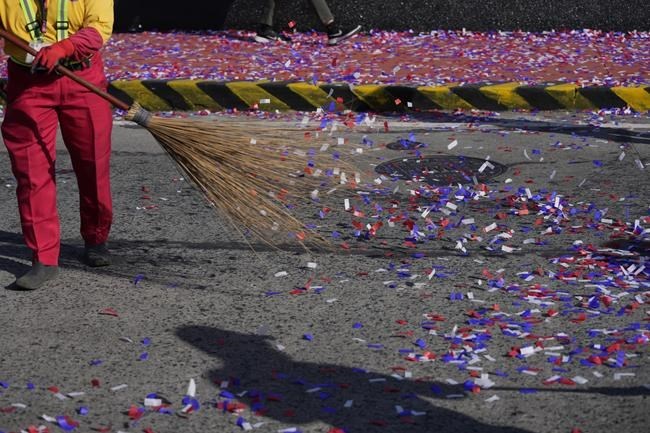
A worker sweeps confetti after ceremonies marking the 37th anniversary of the near-bloodless coup popularly known as "People Power" revolution that ousted the late Philippine dictator Ferdinand Marcos from 20-year-rule at the People's Power Monument in Quezon city, Philippines on Saturday Feb. 25, 2023. It is the first year marking the event under the rule of Marcos Jr. (AP Photo/Aaron Favila)
Republished February 25, 2023 - 2:08 AM
Original Publication Date February 24, 2023 - 9:21 PM
MANILA, Philippines (AP) — Pro-democracy protesters in the Philippines marked the anniversary on Saturday of the 1986 army-backed “people power” revolt with the son of the dictator, who was ousted in that uprising, now leading the country.
About 1,400 demonstrators, some waving Philippine flags and holding placards that read “Never forget,” gathered at a democracy shrine along the main EDSA highway in metropolitan Manila. Left-wing activists, carrying an effigy that depicted President Ferdinand Marcos Jr. as a pest, protested separately at a nearby pro-democracy monument.
Faced with the awkward situation of issuing a statement to mark the revolt that toppled his namesake father, Marcos Jr. called for reconciliation without citing the event as a democratic milestone, as his predecessors had done.
“I once again offer my hand of reconciliation to those with different political persuasions to come together as one in forging a better society — one that will pursue progress and peace and a better life for all Filipinos,” he said in a two-paragraph statement he posted on Facebook.
Renato Reyes of the left-wing alliance Bayan said the president’s offer was a “good sound bite but lacks sincerity and substance” given Marcos Jr.’s refusal to acknowledge abuses under his father’s rule.
Millions of Filipinos converged in February 1986 at the highway to shield top military and defense officials who defected from Marcos' administration. The ailing president, who imposed martial rule from 1972 to 1981, was driven with his family and cronies into U.S. exile.
The uprising became a harbinger of change in authoritarian regimes. But in the nearly four decades since then, poverty, stark inequality between the rich and poor and a failure to address past wrongdoings have remained deeply entrenched, fanning political and social divisions.
The Marcoses returned to the Philippines in 1991 and gradually regained political power despite the plunder and widespread human rights atrocities four decades ago.
In May last year, Marcos Jr. won the presidential race in a landslide victory in one of history’s most dramatic reversal of fortunes.
“It’s mind-blowing in one sense, isn’t it? How did this happen? You remember those who sacrificed their lives and you feel so sad for those who were tortured, those who lost loved ones,” Judy Taguiwalo, a longtime former political detainee and torture survivor, told The Associated Press.
Now 73 and ailing, Taguiwalo said her generation of activists who fought the dictatorship was slowly fading, but she remained defiant.
“There’s a new generation of fighters,” she said. “Tyranny can return but there’s no forever in tyranny so long as we don’t stop resisting even if it’s an uphill battle or we get sidetracked by disinformation.”
Marcos Jr.’s supporters called his massive victory a political vindication. Opponents said he clinched the top post through well-funded social media campaign that whitewashed the family history in a country regarded as one of the top users of Facebook and TikTok.
The president has steadfastly rejected calls for him to apologize for the atrocities and plunder during his father’s rule and said in a TV interview last year that labeling the elder Marcos a dictator was wrong.
The ousted leader died in exile in Hawaii three years after being overthrown without admitting any wrongdoing, including accusations that he and his family amassed an estimated $5 billion to $10 billion while he was in power.
A Hawaii court found him liable for human rights violations and awarded $2 billion from his estate to compensate more than 9,000 Filipinos who filed a lawsuit against him for torture, incarceration, extrajudicial killings and disappearances.
Butch Abad, a prominent activist who joined the 1986 uprising, said the army-backed revolution fortunately did not degenerate into a full-blown civil strife but peacefully restored democracy. He said it should have been used to introduce structural reforms aimed at eliminating poverty, social inequities and other volatile issues that helped ignite the revolt against the dictatorship in the first place.
“Unfortunately, we stopped at ousting a dictator and did not pursue a deepening of democracy,” Abad said.
News from © The Associated Press, 2023